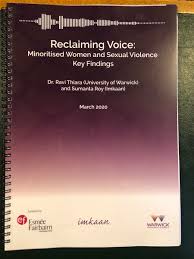On 4 March 2020, the Black feminist organisation Imkaan launched a report in the Houses of Parliament on sexual violence against minoritised women. Entitled Reclaiming Voice, and the result of a collaboration between Sumanta Roy (Imkaan’s head of research, evaluation, and development) and Dr Ravi Thiara (sociologist at the University of Warwick), it is a devastating exposure of the levels of abuse directed against BME women in the UK.

Crucial to their arguments is the need to take intersectionality much more seriously. Intersectional approaches have been an important tool for understanding oppression since 1979, when it was developed by the Combahee River Collective, a Black feminist lesbian organisation based in Boston who were critical of white feminists for ignoring the needs of their Black sisters. The concept insists that racial bigotry, misogyny, class snobbery, homophobia, and all the other forms of prejudice are not discrete realms of experience but interrelated, structural forms of oppression. Reclaiming Voice gives a voice to victims and survivors of a vast array of interrelated harms. They note that BME women and girls face specific problems in making their complaints about sexual victimisation heard. Minoritised women are rightly anxious about the effects of reporting abuse to the police; they experience significantly worse access to medical, legal, and psychological services; they are more likely to be held responsible for their own abuse and, in many cases, are even criminalised themselves for reporting rape.
The impact of sexual violence on the lives of minoritised girls and women is similar to those experienced by more privileged women. It includes depression, anxiety, panic attacks, lowered self-esteem, difficulties sustaining relationships, substance abuse, and self-destructive acts. But BME women face additional harms. Pervasive racism within British society means that they are more likely to be pathologised by the health-care services. Many of the people that BME victims and survivors turn to for support label them as “angry” or “hypersexualised”. In such ways, their voices are effectively silenced.
One of the most important aspects of this report is the way the authors let victims and survivors tell their stories. Although what they say is often painful to hear, there is an emphasis on resistance, resilience, agency, and healing. The process of recovery is a slow one, but necessary. As Reclaiming Voice argues,
Understanding the historical intersectional location of minoritised women and their communities, and the processes of racialisation that add to the trauma of sexual violence, is imperative to more effectively facilitating minoritised survivors’ healing.
The report aims to make a difference. It concludes with five pages setting out ways to improve the lives of victimised women. They urge MPs and other community leaders to speak out about the harms that women are experiencing on a daily basis, drawing attention to the specific and multiple risks facing minoritised women. They make practical national, regional, and local recommendations. They urge grant-making bodies and other funders to develop “bespoke and accessible wrap-around holistic support for minoritised groups that are most likely to encounter intersectional barriers, exclusion and institutional discrimination”. Importantly, the specialist support services need to become sensitive to their role in alleviating harms, supporting the most vulnerable, reviewing issues of accessibility, and improving their practices.
Reclaiming Voice is being published at an important time. Levels of sexual violence are high while support services are increasingly under-funded. Fewer victims find justice done in court. Imkaan has been working with minoritised women and sexual violence for more than two decades yet, they lament, domestic and sexual violence remains high. What can be done? Why, they ask, is violence still so high?
This report is a “must read” for people who seek to make the world a safer place.
FIND OUT MORE:
Website: www.imkaan.org.uk
Twitter: @Imkaan
Facebook: @imkaan
Read the report:
Reclaiming Voice: Minoritised Women and Sexual Violence
04 March 2020